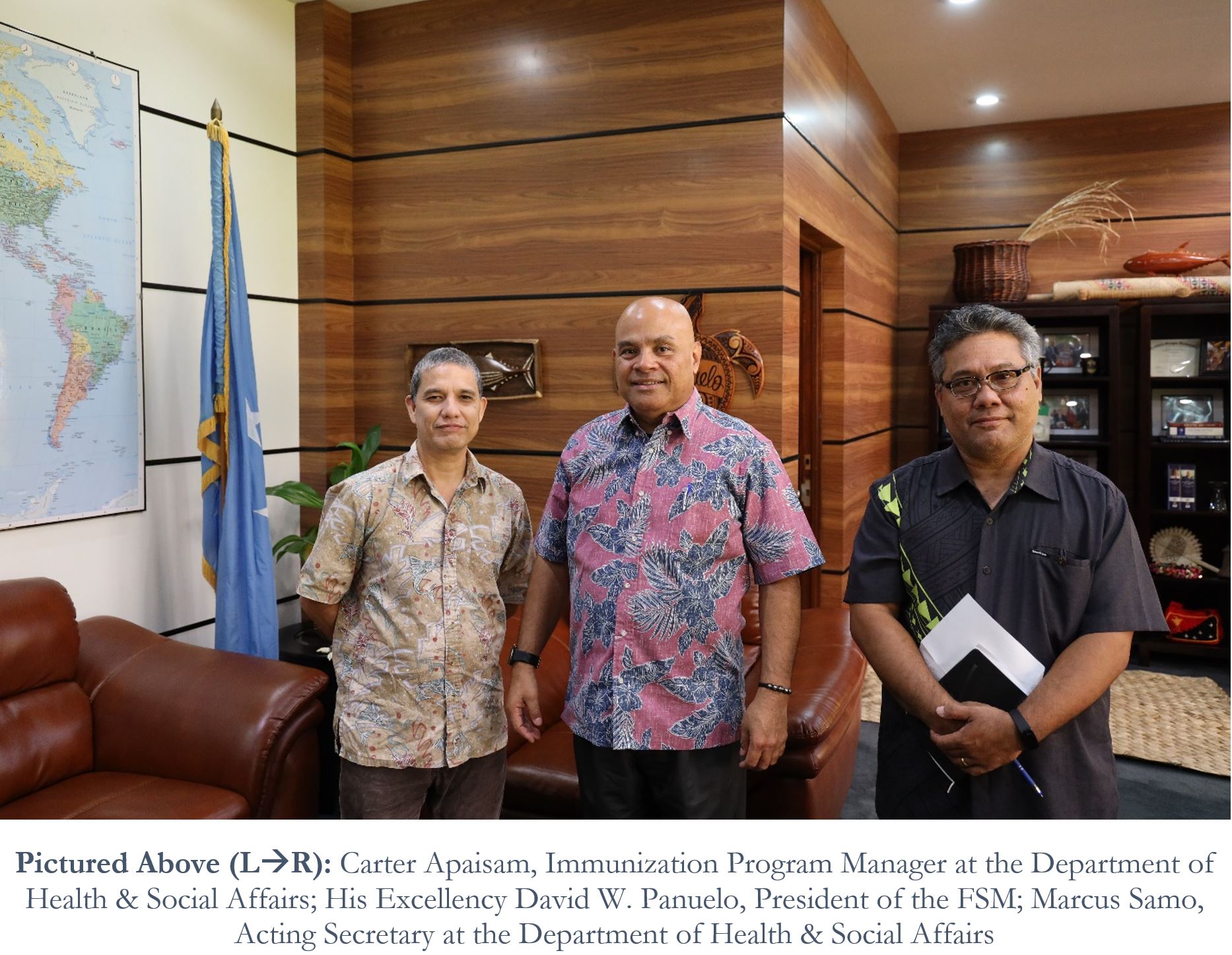
FSM Information Services
Press Release
FSM Prepares for Massive Measles Vaccination Campaign Throughout the Nation, With Emphasis on Outer Islands
PALIKIR, Pohnpei—On December 6th, 2019 His Excellency David W. Panuelo, President of the Federated States of Micronesia (FSM), called a meeting with Marcus Samo, Acting Secretary at the Department of Health & Social Affairs, and Carter Apaisam, Immunization Program Manager, to discuss the FSM’s current vaccination rates against Measles and other viruses. The purpose of the meeting was to brief the President on contemporary vaccination measures, and to strategize how the FSM National Government can embark on a massive vaccination regimen to protect the Nation against the Measles epidemic currently affecting the Independent State of Samoa and other islands. The primary outcome of the meeting is that the President will formally request $500,000 of supplemental funding for the Nation to prevent Measles from affecting the FSM’s children.
“The spread of Measles abroad is truly heartbreaking,” the President said. “I want to get an overview from you on where we are in preventing Measles, and what the Department of Health [and Social Affairs] recommends we do next.”
Acting Secretary Samo and Immunization Program Manager Apaisam explained that the Measles vaccine requires two doses to be effective. At present, approximately 73% of the FSM’s population has received the Measles, Mumps, and Rubella (MMR) vaccine. This can be interpreted as both good news and bad news—the good news being that the vaccination rate is relatively high compared to many other Pacific Islands (e.g. Samoa reportedly had a vaccination rate of approximately 34% in November), the bad news being that a minimum vaccination rate of 95% for the whole country is what medical experts suggest the FSM needs to reach. In other words, the FSM has a lot that it can and must do in a short period of time.
“Let me ask this,” the President said, “If someone who isn’t vaccinated against Measles catches it—the ones who ARE vaccinated, are they…?”
“Protected, yes,” said Acting Secretary Samo. “That’s precisely why we try to increase the coverage as high as we can. And for kids, the most vulnerable group, the total vaccination rate is around 84%.”
Principals and teachers across the Nation are aware that students, in order to be enrolled in school, need their families to submit elemental documentation beforehand—these include one’s birth certificate as well as one’s evidence of receiving appropriate vaccinations (commonly called the “yellow card”). The FSM School Accreditation process implemented by the National and State Departments of Education look for these documents, among others, when they visit schools.
“What are the rates for each of the states?” the President asked. “For very young children.”
In the Target Group of 1-5 year olds, 69% of Chuuk State children have received their second dose of MMR vaccine, compared to 75% in Pohnpei State, 81% in Yap State, and 89% in Kosrae State.
In the Target Group of 6-17 year olds, 79% of Chuuk State children have received their second dose of MMR vaccine, compared to 87% in Pohnpei, 98% in Yap, and 92% in Kosrae.
“It’s the remote, outer, or neighboring islands that we need to reach the most,” Immunization Program Manager Apaisam said. “Though on big islands, the data may be counterintuitive. Pohnpei State Hospital is located in Nett, for example, and Nett has the lowest vaccination rate on Pohnpei proper.”
It was also explained that, because medical teams haven’t been able to visit Yap in some time, that the presented vaccination rate has likely fallen.
Acting Secretary Samo and Immunization Program Manager Apaisam explained that, at present, the current stock of MMR vaccine in the FSM is 3,000 doses. Approximately 15,000 doses are required for the Nation to implement a mass vaccination campaign.
“There’s a 12,000 dose gap,” Acting Secretary Samo said.
“How do we get them?” the President asked.
“All the vaccines come from the [U.S.] Federal Government through the [Centers for Disease Control],” said Immunization Program Manager Apaisam. “We receive one million dollars per year through the Immunization for Children program.”
It was explained that the FSM National Government’s Department of Health & Social Affairs works in conjunction with the State Departments of Health in order to provide essential health services to citizens, including vaccinations. It was explained that approximately $500,000 would be the necessary supplemental funding for the Government to successfully implement a Nation-wide vaccination campaign, with emphasis on the remote outer islands.
“We agree that we need 12,000 more doses of vaccine, a mass information campaign on the importance of vaccinations, and funding for the operational costs of implementing a vaccination campaign including to our most remote and vulnerable populations,” President Panuelo said. “I want you [Department of Health & Social Affairs] to develop a plan on the logistics. Meanwhile, I’ll write to the Governors of each of the States to seek their support, and I’ll write to Congress and speak with [the Honorable Wesley W. Simina, Speaker of the 21st Congress of the FSM].”
The President emphasized that the Government must do everything it can to protect the Nation’s population, especially children. Acting Secretary Samo and Immunization Program Manager Apaisam agreed, and advised that until the supplemental funding is received that the Government will be continuing to implement its regular ongoing vaccination programming.
On November 20th, 2019, President Panuelo reaffirmed the FSM’s commitment to the UN Convention on the Rights of Child. The third right is entitled “Best interest of the Child”, and says that “when adults make decisions, they should think about how their decisions will affect children. All adults should do what is best for children.”
The 24th right is entitled “Health, water, food, environment” and says that “Children have the right to the best health care possible….”
To find out more about how you and your family can protect yourselves and your community from Measles, call your local public hospital or the FSM Department of Health & Social Affairs.
- FSM Department of Health & Social Affairs: +691-320-2872
- Chuuk State Public Hospital: +691-330-7936 (Immunization Program: +691-330-3945)
- Kosrae State Public Hospital: +691-370-3012 (Immunization Program: +691-370-2125)
- Pohnpei State Public Hospital: +691-320-2213/3805 (Immunization Program: +691-320-3144)
- Yap State Public Hospital: +691-350-2115 (Immunization Program: +691-350-2115)

